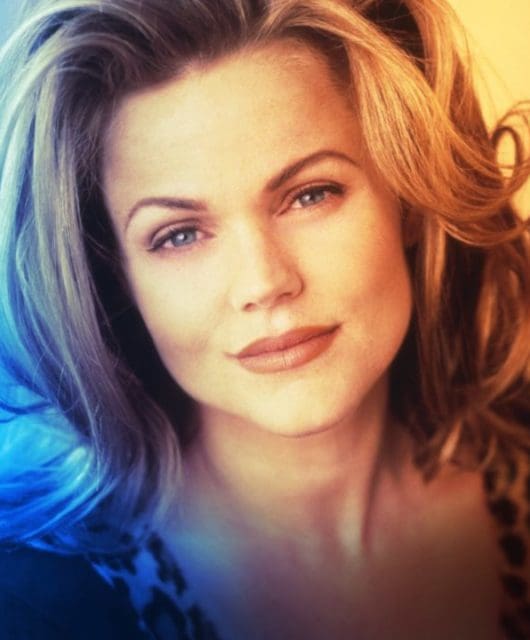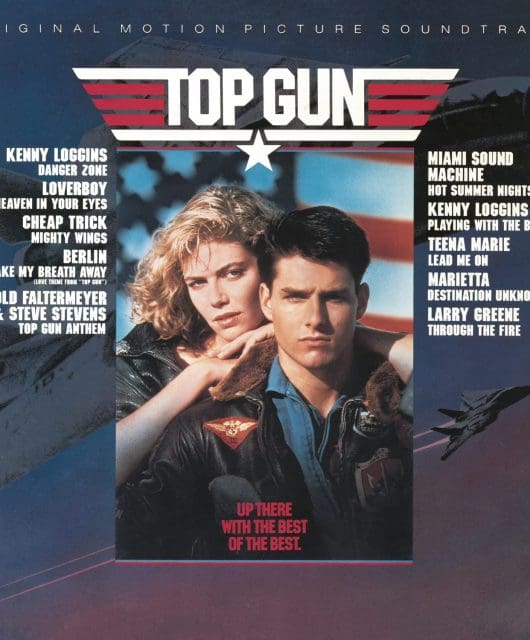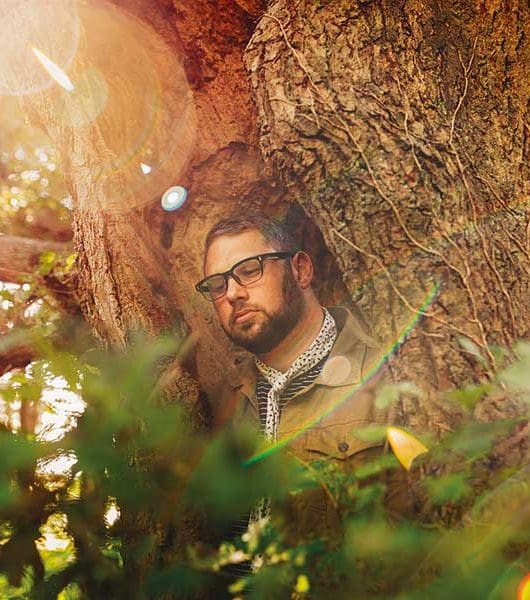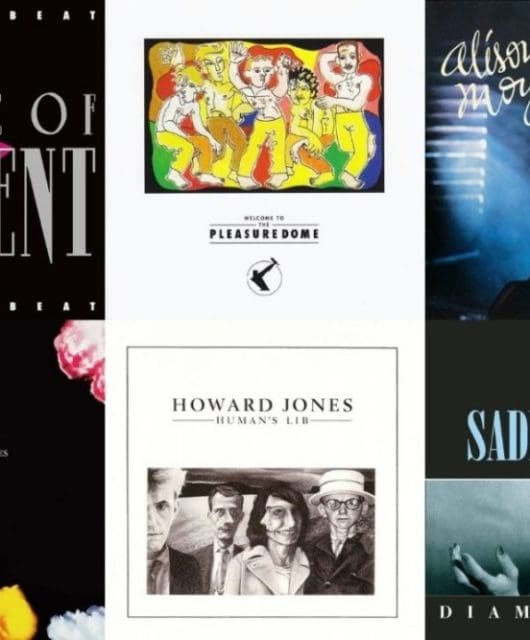Album By Album – Echo & The Bunnymen
By Jon O'Brien | November 20, 2024
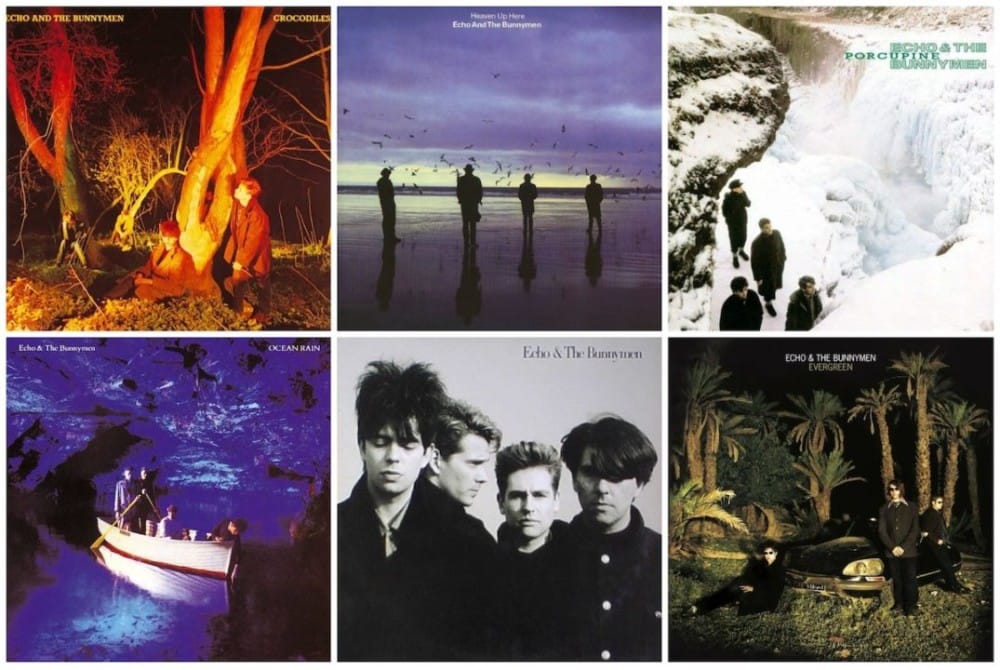
Fronted by the ever outspoken Ian McCulloch, Echo & The Bunnymen became indie heroes with a sound that constantly leaned towards the darker and more dramatic side of post-punk…

CROCODILES (1980) UK No.17
Although Echo & The Bunnymen weren’t the first band to emerge from the ashes of The Crucial Three, an extremely short-lived (just six weeks to be exact) yet ultimately pivotal bedroom trio featuring Ian McCulloch, Julian Cope and Pete Wylie, they were the first to release a full-length LP.
Crocodiles arrived three months before The Teardrop Explodes’ Kilimanjaro and a full year before Wah!’s Nah=Poo – The Art of Bluff. The album’s producers ensured that all three bands remained interlinked, with David Balfe and manager Bill Drummond also working on the former and Ian Broudie mixing two tracks on the latter. But as implied by its title and the mysterious woodland setting of its artwork, the Bunnymen’s debut was a very different beast.
While Cope’s explored the sunnier side of neo-psychedelia and Wylie’s the more passionate, McCulloch’s offshoot aimed straight for the dark jugular on 10 tracks entrenched in themes of death, doom and despair. “Is this the blues I’m singing?” he repeatedly asks on the climax of second single Rescue, a brilliantly meta ode to teenage indecision, and he might as well have been.
Cult Heroes
Although Ian McCulloch remains a proud Liverpudlian, Crocodiles doesn’t paint his hometown in the most positive of lights. “Let’s get the hell out of here,” McCulloch demands on opener Going Up. That’s an understandable rally cry on hearing Villiers Terrace, a resolutely grim, if impressively poetic, snapshot of the drugaddled cultural scene his band were initially lumped in with (“There’s people rolling ’round on the carpet/ Passing ’round the medicine”). Interestingly, the man at the epicentre of the neighbouring Manchester scene, Factory Records’ boss Tony Wilson, declared that Villiers Terrace was one of the best songs ever written. Not for the first time, the impresario might have been guilty of a little hyperbole.
However, Crocodiles is undoubtedly one of the most striking and self-assured debuts of the era. McCulloch, particularly amid the swirling haunted house organs of Pictures On My Wall, has enough confidence to convincingly channel his musical hero Jim Morrison. The rest of the group get their moment to shine, too, though. See Les Pattinson’s driving basslines on Monkeys and guitarist Will Sergeant’s pyrotechnic freakout on album closer Happy Death Men.
Meanwhile, Pete de Freitas’ scattergun rhythms on the foreboding Cold War anthem All That Jazz single-handedly justifies the decision to abandon the ‘Echo’ drum machine that the band used in their early live shows. Crocodiles can be a harrowing listen, for sure, but it’s also repeatedly thrilling. A new bunch of cult heroes were born.

HEAVEN UP HERE (1981) UK No.10
Replaced by Hugh Jones, who had engineered Crocodiles and also co-produced follow-up EP Shine So Hard, a slightly bitter Drummond later described Heaven Up Here as “dull as ditchwater”.
The NME of 1981 certainly didn’t concur, however, giving the Top 10 breakthrough both Best Album and, thanks to the evocative artwork where the silhouetted band scare off a bunch of seagulls on the South Wales coast, the curiously titled Best Dressed Sleeve awards.
It’s true Heaven Up Here has little light to go with its varying degrees of shade. Indeed, despite using The Velvet Underground’s uncharacteristically upbeat What Goes On as a main reference point, it’s arguably even chillier and more oppressive than its predecessor.
Off-kilter Charm
Little surprise, therefore, that its only UK single A Promise failed to chart inside the Top 40. But contrary to Drummond’s belief, it’s an album full of intrigue, and one whose off-kilter charms unfold with each listen. From the Gang of Four-esque riffwork which penetrates No Dark Things and the title track’s wall of sound, Sergeant’s intricate playing – occasionally recorded using a pair of scissors instead of a plectrum for reasons unknown – can take much of the credit. Just ask McCulloch, who’s since attributed the entirety of Heaven Up Here to his lead guitarist, albeit because of his “control freak” tendencies in the studio.
‘Mac the Mouth’, as he’d now become known, still got several chances to take centre stage though, whether interpolating Del Shannon’s rock’n’roll classic Runaway on the smouldering Over The Wall, playing the torch singer on the haunting, beat-free The Disease or engaging in some playful wordplay on the surprisingly funky With A Hip (“With a hip hip hop and a flip flap flop/ Gonna steal some bananas from the grocer’s shop”). He also gets everyone guessing about the meaning of zimbo (an anagram of an old African word apparently) on All My Colours, the percussive highlight that the band famously performed with the Drummers Of Burundi at the inaugural WOMAD.
Heaven Up Here’s lack of discernible hooks means it works more as a collection of soundscapes than songs. Nevertheless, few post-punk outfits have conjured up a record as atmospheric.

PORCUPINE (1983) UK No.2
Having bypassed the second difficult album syndrome, Echo & The Bunnymen suddenly discovered it was number three they had to worry about. While McCulloch was still hellbent on world domination, Pattinson had become more interested in building boats than playing basslines. Meanwhile de Freitas and Sergeant got itchy feet, lending their talents to fellow Scousers Wild Swans and a solo instrumental album respectively.
Tensions were high, therefore, when they reconvened at their Liverpool rehearsal room under the watchful eye of Drummond. While in confident form on Heaven Up Here, de Freitas later said material was more difficult to come by on its follow-up. It didn’t help that WEA sent them back to the studio due to fears about its commercial appeal. Nevertheless, as the saying goes: “From great suffering comes great art.”
Produced by Ian Broudie under the pseudonym ‘Kingbird’, Porcupine not only came within a whisker of the UK No.1 spot, it gave the band two consecutive Top 20 singles, both with arrangements from Indian violinist and composer Shankar Lakshminarayana.
Statement Of Intent
Spawning their Top Of The Pops debut, The Back Of Love briefly suggested the band were muscling in on U2’s stadium rock territory. However, The Cutter, a brilliantly esoteric piece of Middle Eastern-tinged psychedelia which continued their tradition of borrowing from 60s classics (on this occasion Cat Stevens’ Matthew And Son), proved that any sellout accusations were well wide of the mark.
Indeed, despite the interference from their record label, Porcupine was still very much the Bunnymen carving out their own distinct path. The gothic romance of the title track, for example, saw Sergeant ditch the angular guitars for those of the flamenco variety. My White Devil even contained a marimba solo. And which other post-punk outfit were bold enough to give free rein to the man who invented the stereophonic double violin?
While the previously supportive NME carried out a trademark about-turn (“turning on their own greatest ‘hits’ and savaging them”), the paranoia-soaked Porcupine may well be the quartet’s defining statement of intent.

OCEAN RAIN (1984) UK No.4
If WEA thought Porcupine was uncommercial, one can only imagine their faces on hearing the Gil Norton co-produced follow-up Ocean Rain for the first time. Sergeant has said the band wanted a more conceptual piece with lush orchestration – something darkly twisted and not in the realms of Mantovani-style lushness.
Nowhere is that more evident than on shamanic epic Thorn Of Crowns, in which frazzled guitars resemble acid house bleeps and McCulloch flits between howls and stuttered lists of vegetables.
Yet Nocturnal Me, part-sea shanty, part-military march, part-Eastern European cabaret, and macabre mini-suite The Yo Yo Man, (“Collecting the bones of my friends tonight/ Sowing the seeds in a fruitless land”) are nearly as wonderfully deranged. Ironically, Ocean Rain also boasts the band’s biggest hit and, with over 170 million Spotify plays, by far their most enduring.
Magnum Opus
While millennials may know The Killing Moon from the Donnie Darko soundtrack, Generation X will remember it as 1984’s crowning indie glory, a majestic blend of shimmering Space Oddity-inspired guitars, torch song melodies and astronomical imagery. “I know there isn’t a band in the world who’s got a song anywhere near that,” a typically immodest McCulloch once told The Guardian. In this instance, his self-aggrandising has a ring of truth.
Although nowhere near as ubiquitous, follow-up singles Silver and Seven Seas are top-tier Bunnymen, too, the former a surprisingly jangly opener which eased listeners into all the wonkiness ahead, the latter a nautical tale in which Norton’s production sounds every bit as cavernous as the album’s cover.
McCulloch had recorded his vocals in Paris alongside the 35-piece orchestra which gives Ocean Rain its baroque sheen. But dissatisfied with the results, an overindulgence in the capital’s many brasseries apparently to blame, he decided that less inebriated hometown retakes were in order.
It was a wise decision, McCulloch’s booming baritone clearer and more expressive than ever before, particularly on the funereal title track, which brings what many consider to be their magnum opus to a dignified end.

ECHO & THE BUNNYMEN (1987) UK No.4
The start of a transitional period for Echo & The Bunnymen, their self-titled fifth LP was the band’s first since replacing Drummond with Duran Duran’s tour manager Mick Hancock, their final with de Freitas, whose addiction issues had caused him to resign and then beg for his reappointment during its recording, and their most concerted bid for the mainstream. A successful one as it goes, its No.51 peak on the US Hot 100 Billboard still their highest to date.
Produced by Laurie Latham, who’d worked on their Pretty In Pink contribution Bring On The Dancing Horses, Echo & The Bunnymen has repeatedly been dismissed by the band themselves, with Sergeant describing it as “overcooked fish”, and McCulloch, “the sound of radio America”. Perhaps burned by its difficult inception – there were also failed attempts with previous producers Norton and Broudie, while WEA boss Rob Dickens implored them to try to echo Peter Gabriel’s So, much to their disdain – that’s a little harsh on a record which although far more direct, still retains the general sense of Bunniness.
Bunnymen In Transition
Since covered by artists as diverse as Coldplay, Seal and David Hasselhoff, Lips Like Sugar certainly merits a place on any Best Of, its Anton Corbijn-directed Star Trek-esque promo video briefly turning Liverpool’s moodiest music exports into unlikely MTV heroes. Likewise, the unexpectedly groovy third single Bedbugs And Ballyhoo, whose guest appearance from the legendary keyboardist Ray Manzarek practically invited further comparisons to The Doors.
Elsewhere, gorgeous closer All My Life hinted at both the band’s future (“Oh how the times have changed us/ Sure and now uncertain/ Men not devils have claimed us”) and the stately guitar pop of their 90s comeback, while the driving Lost And Found proved how much of a loss they were about to suffer.
The Bunnymen may have stumbled on for five more years, but for all intents and purposes, this is their original swansong, and a majestic one at that.

REVERBERATION (1990) UK No.96
Following McCulloch’s acrimonious departure in 1988 (“more interested in changing oil in their cars than rock’n’roll” was the verdict on his bandmates in an interview with Kieran Grant in 1997), it was assumed the remaining members would call it a day. Much to their ex-frontman’s disgust, however, the trio forged ahead with a replacement and, in 1990, a sixth LP.
The signs were ominous when de Freitas was tragically killed in a motorcycle accident on his way to the first rehearsal. Undeterred, Sergeant, Pattinson and new singer Noel Burke soldiered on, recruiting their touring keyboardist Jake Brockman and future Spiritualized drummer Damon Reece.
Even taking all the personnel changes into account, it’s striking just how different this Version 2.0 sounds, somewhere between the psychedelia of the 60s (album producer Geoff Emerick engineered Sgt. Pepper) and the baggy movement of the late 80s. Burke occasionally attempts to channel his predecessor’s deep croon, as on Thick Skinned World. However, his vocals have more in common with Morrissey, particularly on the New Order-ish opener Gone, Gone, Gone.
While no lost classic, Reverberation would likely be more fondly appreciated without its baggage. A chart flop, the band were dropped and two years on, pulled the plug, apparently for good.

EVERGREEN (1997) UK No.8
You can’t keep a Bunnyman down for too long. Just four years after the much-maligned second incarnation of Liverpool’s finest called it a day, the surviving original line-up staged one of post-punk’s finest comebacks.
Arriving at the tail end of Cool Britannia, Evergreen essentially served as a precursor to the post-Britpop era, laddishness and Beatles-worship replaced by heart-on-sleeve sentiments, sweeping orchestral strings and a general sense of melancholy. Had Urban Hymns not arrived just two months later, you might think The Verve had copied its template.
The Bunnymen’s unexpected seventh LP didn’t reach the same million-selling heights, but it did spawn their joint-biggest hit. Peaking at No.8, the instant classic Nothing Lasts Forever was a fitting message for a time when New Labour’s honeymoon period and Oasis’ imperial phase were all wrapping up: backing vocalist Liam Gallagher no doubt wished the impending Be Here Now had something even half as dignified.
Just A Touch Away and closer Forgiven were similarly bittersweet symphonies, the latter summarising McCulloch’s push-pull (“A blinding light, a blackest night/ They’re both inside of me”). Meanwhile, the grunge-lite I’ll Fly Tonight, the closest the album gets to McCulloch and Sergeant’s 90s side project Electrafixion, spiritual Don’t Let It Get You Down and the no-nonsense Altamont allowed Robert Plant drummer Michael Lee the chance to prove his worth. Against all odds, the Bunnymen delivered a reunion masterclass.

WHAT ARE YOU GOING TO DO WITH YOUR LIFE? (1999) UK No.21
“What are you going to do with your life?” Echo & The Bunnymen asked at the turn of the millennium, a timely existential question further highlighting their ability to capture the general mood of the era. Their own answer appeared to be ‘make a record more introspective, melancholic and world weary than ever before’.
Indeed, the presence of co-producer Alan Douglas (The Jam, Adam Ant) and modern-day lounge lizards Fun Lovin’ Criminals may well have suggested a post-modern return to their psychedelic roots. However, the former seemed to issue a near-blanket ban on guitars, while the latter provides musical accompaniment only. There are no Quentin Tarantino samples, hip-hop beats or smoothtalking lotharios to be found here.
Sign Of The Time
Quite understandably, Sergeant didn’t appreciate his talents being sidelined and characterised the album’s recording as among the worst periods of his life. And with Pattinson choosing to make his exit in the wake of both a family illness and repeated arguments with McCulloch, the band were in danger of imploding once more.
The Bunnymen’s eighth album occasionally alludes to all the tension – “There’s something going wrong again,” an unusually hushed McCulloch croons on the acoustic title track. But in another example of their contradictory nature, the record is the band’s most harmonious, with the pop classicism of the 1960s an obvious reference point. When It All Blows Over essentially paraphrases The Beatles’ When I’m 64, for example, while there are shades of Burt Bacharach on final track Fools Like Us.
In fact, What Are You Going To Do With Your Life? sounds more like a follow-up to McCulloch’s solo debut Candleland than one to the Evergreen LP. The band’s final Top 40 hit Rust borrows wholesale from his 1992 B-side Ribbons And Chains. It sounds like Echo & The Bunnymen are once again closing the curtains on their career. Not for the first time, though, their tenacity saw them return once more.

FLOWERS (2001) UK No.56
“It was the wrong vehicle we were driving, left-hand drive,” remarked an uncharacteristically self-critical McCulloch to Uncut about the band’s first entirely self-produced affair. “We were just spinning round with no direction or knowledge of where to turn off.” For once, the Liverpudlian was selling Echo & The Bunnymen a little short.
While it is far from their most essential record, Flowers still contains some of their best work as a duo. The aquatic pedal effects, vibraphones and chilled grooves of opener King Of Kings help provide an immaculate slice of 60s lounge-pop. While, making great use of the theremin, Buried Alive is a poetic ode to the past (“Somewhere under a Delvaux moon/ Childhood’s end came too soon”) which takes its cues from 70s Lou Reed. And album closer Burn For Me proved that Mac the Mouth could still knock out a lighterwaving ballad in his sleep.
It’s also their most playful, with McCulloch appearing to channel Liam Gallagher’s elongated vowels on the Britpop throwback Make Me Shine. And although It’s Alright proved their adoration of The Doors remained intact, the more bubblegum psychedelia of tongue twister An Eternity Turns suggested they also have an affinity for The Monkees. While its predecessor hinted that the pair were settling into middle age, Flowers proved that they weren’t ready for the pipe and slippers just yet.

SIBERIA (2005) UK No.83
2001 retrospective Crystal Days seemed to inspire McCulloch and Sergeant to further embrace the past, reuniting with Heaven Up Here producer Hugh Jones for a record steeped in both the sounds and mythology of their 80s heyday.
The autobiographical Parthenon Drive serves as a sequel of sorts to Villiers Terrace; the foot-stomping Of A Life namechecks their first compilation Songs To Learn And Sing, while the grungy Scissors In The Sand harked back to when Bunnymen lyrics were at the oblique end of the poetry spectrum (“Something on the roof/ And in the wall/ My silverfishing youth/ Swim don’t crawl”).
Siberia also puts Sergeant front and centre more than any post-comeback affair, from the echo-drenched riffs on In The Margins and jagged buzzsaws of Sideways Eight to the chiming wall of sound on Make Us Blind, which is a highlight of the Bunnymen’s 21st century output.
Released during the peak of indie sleaze, the public were sadly more interested in those the Bunnymen inspired: Siberia remains their only LP to miss the UK Top 75. But it’s far more welcoming than its chilly title implies.

THE FOUNTAIN (2009) UK No.63
Known for producing boybands Busted and 5ive, John McLaughlin was a curveball appointment for the band’s 11th studio effort. Before the purists could bring out their pitchforks, however, The Fountain was entirely free of any schoolboy punk or SMTV-friendly pop. More’s the pity, you could say.
Indeed, had the independent release spawned a little more synchronised stagejumping, it might not have wound up as the most nondescript record of their career. It starts promisingly, with the surging Think I Need It Too, possibly their strongest lead single this century. But elsewhere, only the funky Life Of A Thousand Crimes and barroom stomper Proxy stand out from an LP seemingly designed for the XFM playlist.
Even the title track, apparently featuring vocals from longtime fan Chris Martin, sounds like the band going through the motions, its nautical lyrics serving as a reminder of a far more captivating past.
The Fountain marked the point where Echo & The Bunnymen had released as many albums in their second phase as their first. It was also the point where they’d appeared to have run out of ideas.

METEORITES (2014) UK No.37
“More edgy than anything I’ve ever done,” came Ian McCulloch’s regular boast about the 12th Echo & The Bunnymen outing, and possibly final, entirely original album. Lyrically, he may be right. Instead of drowning in metaphors, much of this LP shoots a little straighter. Final track New Horizons addresses the difficult relationship with his gambling addict father, while Grapes Upon The Vine tackles McCulloch’s own dependency.
Musically, this is the band accepting their elder statesmen status, evident by the opening title track’s arrangement. No stranger to string-soaked indie-rock as producer of The Verve’s Urban Hymns, Youth gives McCulloch and Sergeant the freedom to indulge. None more so than on Market Town, a seven-minute epic where the former bemoans social decay above the latter’s wall of squalling guitars.
Lovers On The Run is similarly grandiose, a burst of sweeping romanticism which sounds like the sequel to The Killing Moon, and the sumptuous balladry of Burn It Down.
Meteorites isn’t quite the celestial experience promised. It still lacks the tension of the group’s classic rhythm section, highlighted by Sergeant’s reunion with Pattinson on their side project Poltergeist one year earlier, and McCulloch’s whining on Holy Moses is possibly his vocal nadir. But it’s another example of how you should write Echo & The Bunnymen off at your peril.

THE STARS, THE OCEANS & THE MOON (2018) UK No.11
Ever wanted to hear a hotel lounge version of Nothing Lasts Forever? Seven Seas transformed into a sorrowful sea shanty? The Killing Moon stripped down like Gary Jules’ version of Mad World? Well, The Stars, The Oceans & The Moon is the Echo & The Bunnymen album for you.
Just when it looked as though they had rediscovered their mojo once again, Echo & The Bunnymen succumbed to the lazy concept that befalls every veteran guitar band at some point or other: the re-recorded Greatest Hits. Not that McCulloch was particularly bothered about any groans of disappointment that greeted its release. “I’m not doing this for anyone else,” he explained in a press statement. “I’m doing it as it’s important to me to make the songs better.”
Even the most charitable of listeners would struggle to find one example in which this goal was achieved. On Zimbo, the original title of All My Colours, it’s perhaps the closest it gets, transforming the tribal number into the kind of twangy blues you can imagine gracing a David Lynch chiller. However, the majority of this back catalogue trawl lacks the vibrancy of the originals.
Echoes Of The Past
McCulloch also seems to be struggling to recapture lightning in a bottle. His sonorous voice has always showed the effects of his chain-smoking, alcohol-fuelled lifestyle. Even on the band’s debut, you could practically smell the Benson & Hedges. Yet here, particularly on the Britpop-esque retooling of Lips Like Sugar, he seems to be wrestling with notes he once knocked out of the park.
Admittedly, there’s nothing that could be considered a trainwreck. Co-producer Jez Wing, a graduate of the group’s hometown LIPA, keeps things restrained and refined. And two new songs, The Somnambulist and How Far?, are perfectly fine additions to the group’s arsenal of indie-rockers.
But, although it returned the band to the Top 20 in the UK for the first time in nearly two decades, it’s the pure definition of inessential.
For more on Echo & The Bunnymen click here
Read More: Will Sergeant interview



